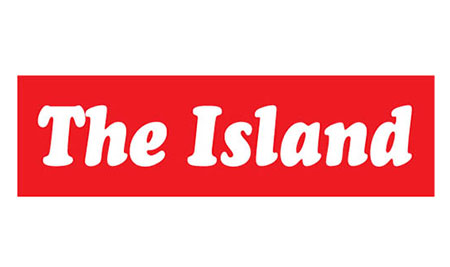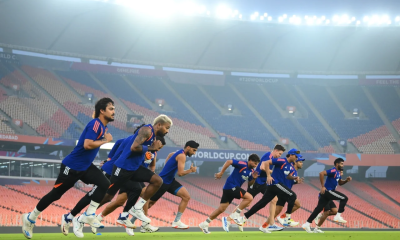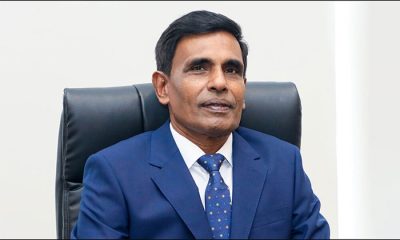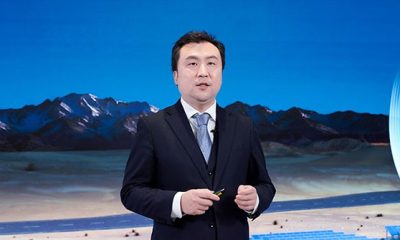Editorial
When haste leads to trouble

Monday 25th October, 2021
Farmers’ protests against the prevailing fertiliser shortage are gathering momentum, but Agriculture Minister Mahindananda Aluthgamage insists that there are enough stocks of fertiliser in the country. He says the protests are politically motivated. It is doubtful whether anyone will buy into his claim. There would have been no such protests if fertiliser had been freely available. The possibility of agrochemical companies having a hand in protests cannot be ruled out, but what actually fuels the street demonstrations is the anger of farmers who have suffered crop losses due to the fertiliser shortage.
The incumbent administration implements its policies exactly the way the country’s war on terror had been fought prior to 2006; governments launched much-publicised offensives against the LTTE only to call them off owing to heavy losses the military suffered. The SLPP government has launched several blitzkriegs, as it were, to achieve some policy objectives, during the past several months, but without much success or, in some cases, with disastrous consequences.
The overuse of agrochemicals has been a ‘grave’ problem. What is given free of charge is often overused or wasted, and the previous Rajapaksa administration’s wisdom of giving a fertiliser subsidy stands questioned. Most farmers used to apply agrochemicals liberally even to loosen soil before harvesting manioc. The practice of spraying insecticides on vegetables ready to be harvested has been prevalent among most cultivators. President Gotabaya Rajapaksa has rightly pointed out that water in streams and wells adjacent to paddy fields cannot be used for drinking due to agrochemical runoff or leaching. The unregulated use of agrochemicals has also led to ecological disasters; it has killed insects and birds that prey on pests such as rats, and mosquito larvae. The owl and the dragonfly are among the worst affected species, according to environmentalists. Soil cannot recover due to the repeated application of overdoses of weedicides, pesticides and chemical fertilisers. These issues must be tackled, but systematically. It was a mistake for the government to ban all agrochemicals overnight. It should have taken steps to reduce the use of agrochemicals while introducing organic fertilisers and educating the farming community on the advantages of the proposed changeover. That way, it could have won over farmers because they want to keep production costs low and lead a healthy life. The fertiliser blitz, as it were, has backfired with farmers taking to the streets, and wily politicians cashing in on their frustration to gain political mileage.
Traders at the Manning market are complaining of a decrease in vegetable supplies, and they blame it on the agrochemical ban. If this claim is true, then it can be argued that the market situation presages serious problems for both the public and the government. Shortfalls in supplies will send vegetable prices through the roof, making it even more difficult for the people to make ends meet.
The country is in this mess because the government, in its wisdom, telescoped its organic fertiliser programme, which should have been phased over a couple of years. Even some Agriculture Ministry higher-ups have admitted that the sudden fertiliser ban was based on wrong advice, according to newspaper reports. Former President Maithripala Sirisena has gone on record as saying that he and the SLFP urged the powers that be to tread cautiously instead of banning agrochemicals overnight. Their advice went unheeded, he has claimed. Their SLPP counterparts are raking them over the coals for having said so. Sirisena and his party may be flayed for many things, but they have got it right on this score, and the government worthies had better stop bashing the SLFP and make a course correction.
One cannot but appreciate President Rajapaksa’s initiative to promote organic agriculture like his renewable energy programme. But it should be carried out gradually in a sustainable manner. If only the President and his advisors heeded the oxymoronic adage, festina lente— ‘make haste slowly’.
Editorial
Caught, released and caught again

Arumahandi Janith Madushanka de Silva alias Podi Lassi, a dangerous underworld character, who was arrested in India, was brought back to Sri Lanka yesterday. On watching his arrival at the BIA, Citizen Perera must have uttered the same words as Mr. Bumble in Oliver Twist: “The law is an ass”. Criminals are caught, released and caught again. Arresting an underworld figure is no walk in the park. It takes months of meticulous planning to nab powerful criminals protected by private armies. The crime busters who risk life and limb to track down criminals are demoralised when the suspects they arrest get bail and flee the country.
Podi Lasi was arrested in 2020 and detained in the Boossa high-security prison, together with some other dangerous criminals. He secured bail in 2024. It was obvious that he would flee the country. He played the victim card, claiming that the STF was planning to kill him. His lawyers even demanded that he be given protection. He disappeared soon afterwards, and no one was surprised.
Many an eyebrow was raised when Podi Lassi was enlarged on bail, for he had even issued death threats to the then President and the Defence Secretary. In 2020, while in detention, Podi Lasi and two other underworld characters known as Kosgoda Tharaka and Pitigala Keuma threatened to harm the then President Gotabaya Rajapaksa, Defence Secretary General Kamal Gunaratne, and some senior prison officers. Podi Lassi bragged that his hit squads were capable of taking any target. Those who are charged with less serious offences than drug smuggling and underworld activities are denied bail in this country to prevent them from intimidating witnesses and fleeing overseas.
One may recall that a notorious drug dealer named Mohommad Najim Mohommad Imran alias Kanjipani Imran obtained bail in 2022. Everybody knew that he would flee the country, and he did so a couple of weeks later. The then Public Security Minister Tiran Alles claimed that some unscrupulous lawyers had facilitated Imran’s escape and that of another criminal called Ganemulle Sanjeewa. Imran had been arrested in Dubai together with Sri Lanka’s Napoleon of Crime, Samarasinghe Arachchige Madush Lakshitha alias Makandure Madush in 2019, and brought back to Colombo. Madush perished allegedly in a crossfire between the police and an underworld gang while in custody. Imran has been running his crime syndicate here from overseas. He is believed to have masterminded the murder of Wasantha Perera or Club Wasantha in 2024. Ganemulle Sanjeewa was gunned down inside a courtroom in Colombo in 2025.
Some underworld kingpins have turned this country into a narcotic hub, for all intents and purposes, if the sheer amounts of dangerous drugs frequently taken into custody are any indication. They are capable of killing anyone anywhere. A lawyer and his wife were gunned down near the defence headquarters complex, Akuregoda, recently.
It is public knowledge that whenever a drug czar is netted, a well-coordinated operation gets underway to secure his release, with lawyers, politicians, and some rogue elements in the police and other state institutions such as the Government Analyst’s Department springing into action. In September 2023, Nadun Chinthaka Wickremaratne alias Harak Kata almost escaped from the CID headquarters where he was detained and interrogated. If not for some vigilant STF personnel, his crime syndicate would have been able to launch a spectacular operation with the help of some commandos and spring him free. Salindu Malshitha alias Kudu Salindu, arrested with Harak Kata in Madagascar, and extradited to Sri Lanka in 2023 also fled the country after obtaining bail.
Sri Lanka’s anti-narcotic laws are characterised by glaring inadequacies that allow clever lawyers appearing for wealthy drug lords to drive a coach and horses through them. They have done so on numerous occasions much to the dismay of the police and the public. The need for laws with stronger teeth to deal with drug lords and other such criminals firmly and make this country safe for the ordinary citizens cannot be overemphasised.
Editorial
Contest of attrition in health sector

Saturday 28th February, 2026
The JVP-NPP government is practising the very antithesis of what it promised workers during its election campaigns. Pledging to look after workers’ interests, the JVP/NPP leaders said there would be no need for labour struggles under an NPP government. But they are now emulating their predecessors who mismanaged labour issues and suppressed trade unions.
The government has locked horns with the GMOA (Government Medical Officers’ Association). They are engaged in a contest of attrition, which is not likely to end any time soon, given the intransigence of both sides. The government is determined to wear down the GMOA, and vice versa. The warring doctors have withdrawn from health camps and outreach programmes and threatened to intensify their trade union action. One wonders whether the medical professionals in the NPP parliamentary group have sought to settle old scores with the GMOA, which they are not well disposed towards; instead of making a serious attempt to resolve the ongoing trade union dispute amicably, they keep on provoking the protesting doctors.
The GMOA has put forth several demands, including the establishment of a special service category called the “Sri Lanka Medical Service,” for all doctors, updating the Disturbance, Availability and Transport (DAT) allowance, resolving transportation issues in line with Circular 22/99, converting the additional duty allowance into a fixed allowance, resolving issues related to research allowances, addressing concerns of doctors engaged in postgraduate studies, updating the approved cadre of doctors in the health sector and initiating time-bound discussions with the Ministry of Finance on the doctors’ demands.
What is up the government’s sleeve is not difficult to guess. The JVP/NPP is all out to tame the trade union sector, which is strong enough to act as a countervailing force against it. The GMOA is one of the most powerful trade unions, and the government’s battle plan seems to be suppressing it in a bid to intimidate all others into submission. The JVP/NPP leaders have apparently learnt from how the LSSP, as a constituent of the SLFP-led United Front government, broke the bank employees’ strike in 1972. The J. R. Jayewardene government crushed a general strike in a brutal manner in July 1980 by sacking tens of thousands of strikers, and thereby effectively neutralised the trade union sector. All governments with steamroller majorities succumb to the arrogance of power, which drives them to ride roughshod over trade unions and professional associations that refuse to obey their dictates.
Opinion may be divided on the GMOA’s demands, and in fact it may not be possible to meet some of them for pecuniary reasons, but it defies comprehension why the government refuses to listen to the protesting doctors, and adopt a compromise formula. Political muscle flexing will only make an already bad situation far worse in the health sector. The government should not dupe itself into believing that tactics such as astroturfing and social media attacks will help tame trade unions.
Labour disputes tend to snowball and cause hardships to the public. Hence the need for swift action to resolve them. It behoves the government, which came to power, promising to look after the interests of workers, to invite the GMOA to the negotiating table and try to prevent the escalation of the ongoing dispute.
Editorial
Coal, sweets and bitter reality

Friday 27th February, 2026
Three teenage girls from a children’s home in Kalutara have been arrested for breaking into a canteen and making off with a stock of confectionery worth Rs. 40,000. Upon being informed of the theft, the police lost no time in recovering the sweets and making arrests. Those who conducted the ‘raid’ posed for photographs with the recovered items and released them to the media. Such is their selective efficiency.
One may recall that some years ago, the police arrested a small schoolgirl in Kalutara for stealing a few coconuts. In the same district, a little girl was taken into custody for stealing a five-rupee coin. If only the long arm of the law dealt with the politically backed perpetrators of serious crimes in a similar manner.
The three girls arrested for stealing sweets may have thought that in a country where people get away with grand thefts, their offence would go unnoticed. The incumbent government tells us that its political rivals stole colossal amounts of state funds while in power, but no legal action has been taken against most of them. Worse, the corrupt politicians in the Opposition have embarked on a crusade against corruption.
Worryingly, the incumbent government, which has undertaken to eliminate bribery and corruption and restore the rule of law, is led by a party with a history of terrorism, extortion, armed robberies and wanton destruction of state assets. A Cabinet minister has had the audacity to boast that he and his ‘comrades’ destroyed transformers, etc., in the late 1980s. He has sought to romanticise such acts of terrorism which are nonbailable transgressions under the Offences Against Public Property Act. Strangely, no action has been taken against him or his colleagues on the basis of his confession. If such crimes had been investigated properly during previous governments, some of the ruling party politicians who indulge in moral grandstanding would have been behind bars.
It has now been revealed that the procurement of eight shipments of substandard coal has caused a staggering loss of Rs. 8 billion to the state coffers. The coal supplier is said to be a company blacklisted for selling substandard rice to Sathosa. The corrupt coal tender has not been cancelled.
The present-day rulers, who came to power vowing to eliminate bribery and corruption, are now in overdrive, trying to justify losses caused by low-grade coal imports and shield the racketeers. Substandard medicines imported after the 2024 regime change have not only caused massive losses to the state but also snuffed out several lives in government hospitals. Much has been spoken in Parliament about corrupt procurement deals in Sathosa under the current dispensation. Curiously, no arrests have been made.
What was made out to be a new beginning in late 2024 has turned out to be another false dawn. The champions of good governance have been exposed for corruption and abuse of power.
The current rulers claim to be on a mission to restore the rule of law in keeping with one of their main campaign promises. That no doubt is a noble goal that must be achieved. However, mere rhetoric won’t do. They have to back up their words with deeds.
The least the government can do to convince the public that it is serious about fulfilling its pledge to restore the rule of law is to ensure that the police deal with the corrupt elements in both the Opposition and the government in the same way as they did in the case of the three girls who stole sweets in Kalutara.
-

 Features6 days ago
Features6 days agoLOVEABLE BUT LETHAL: When four-legged stars remind us of a silent killer
-

 Business6 days ago
Business6 days agoBathiya & Santhush make a strategic bet on Colombo
-

 Business6 days ago
Business6 days agoSeeing is believing – the silent scale behind SriLankan’s ground operation
-

 Latest News7 days ago
Latest News7 days agoIndia, South Africa meet in the final before the final
-

 News7 days ago
News7 days agoIllegal assets of underworld figures frozen since September, Minister tells parliament
-

 Features6 days ago
Features6 days agoProtection of Occupants Bill: Good, Bad and Ugly
-

 News6 days ago
News6 days agoPrime Minister Attends the 40th Anniversary of the Sri Lanka Nippon Educational and Cultural Centre
-

 Business6 days ago
Business6 days agoHuawei unveils Top 10 Smart PV & ESS Trends for 2026













